Charles E W Bean, Diaries, AWM38 3DRL 606/116/1 - June - September 1918 - Part 15
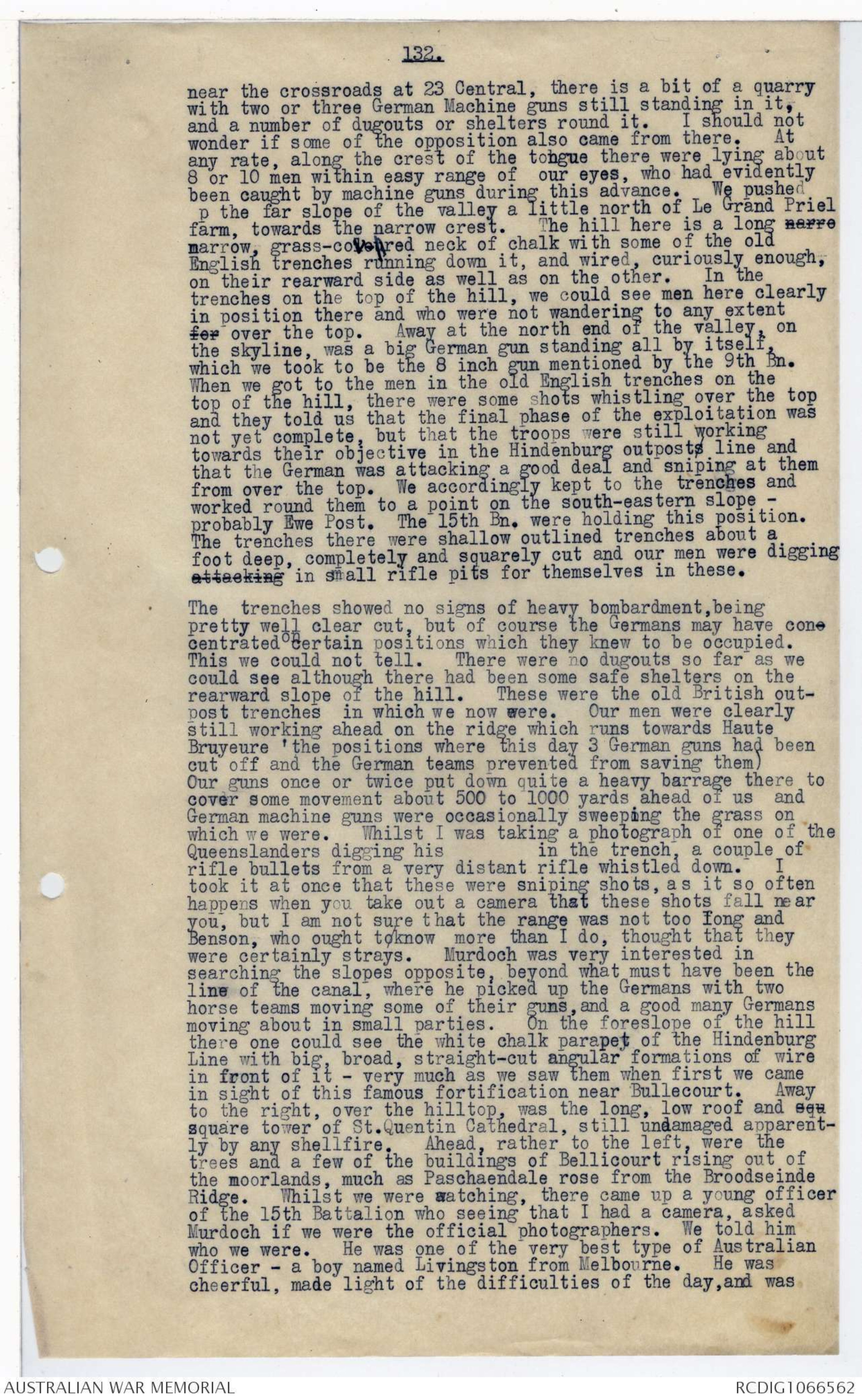
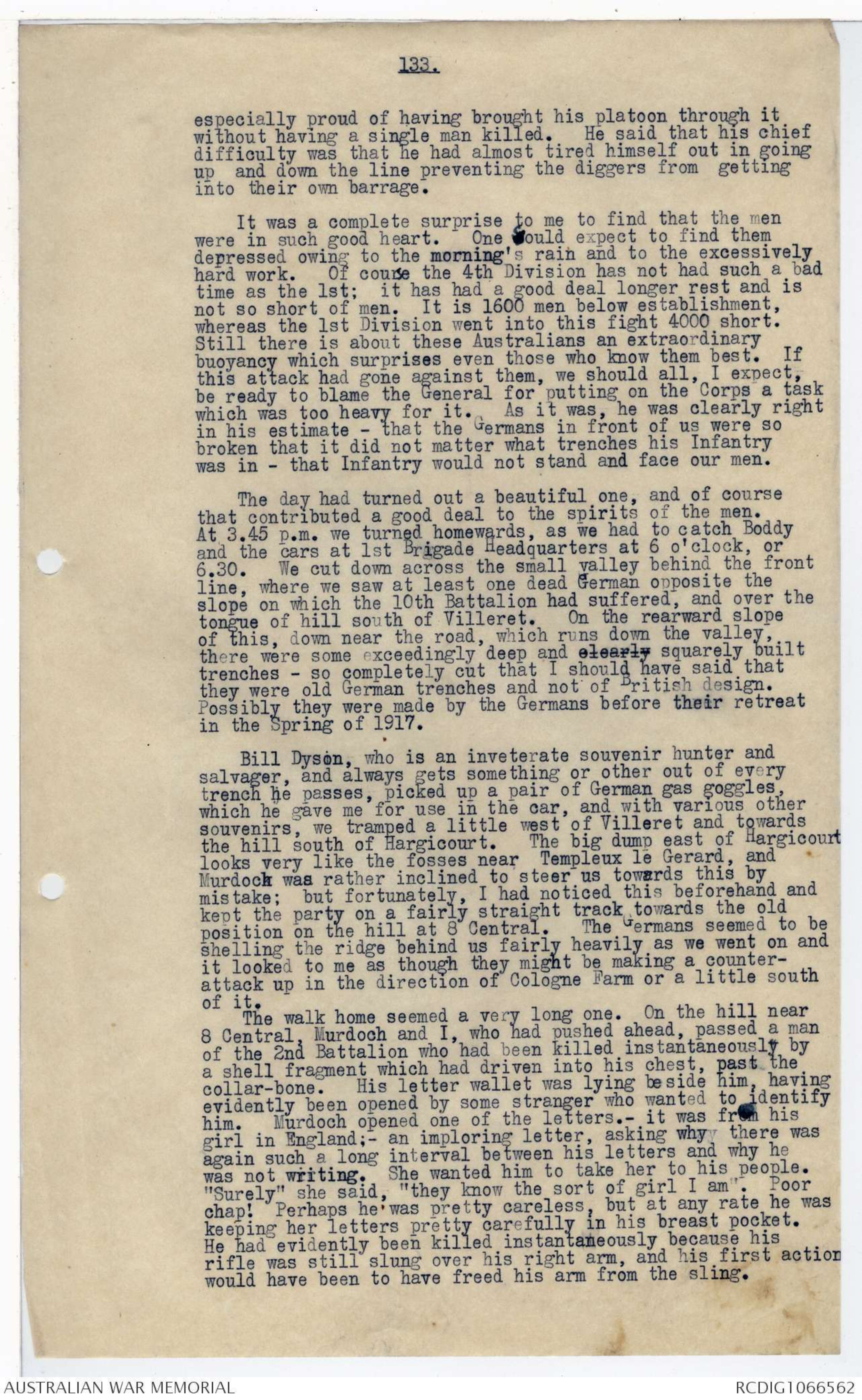
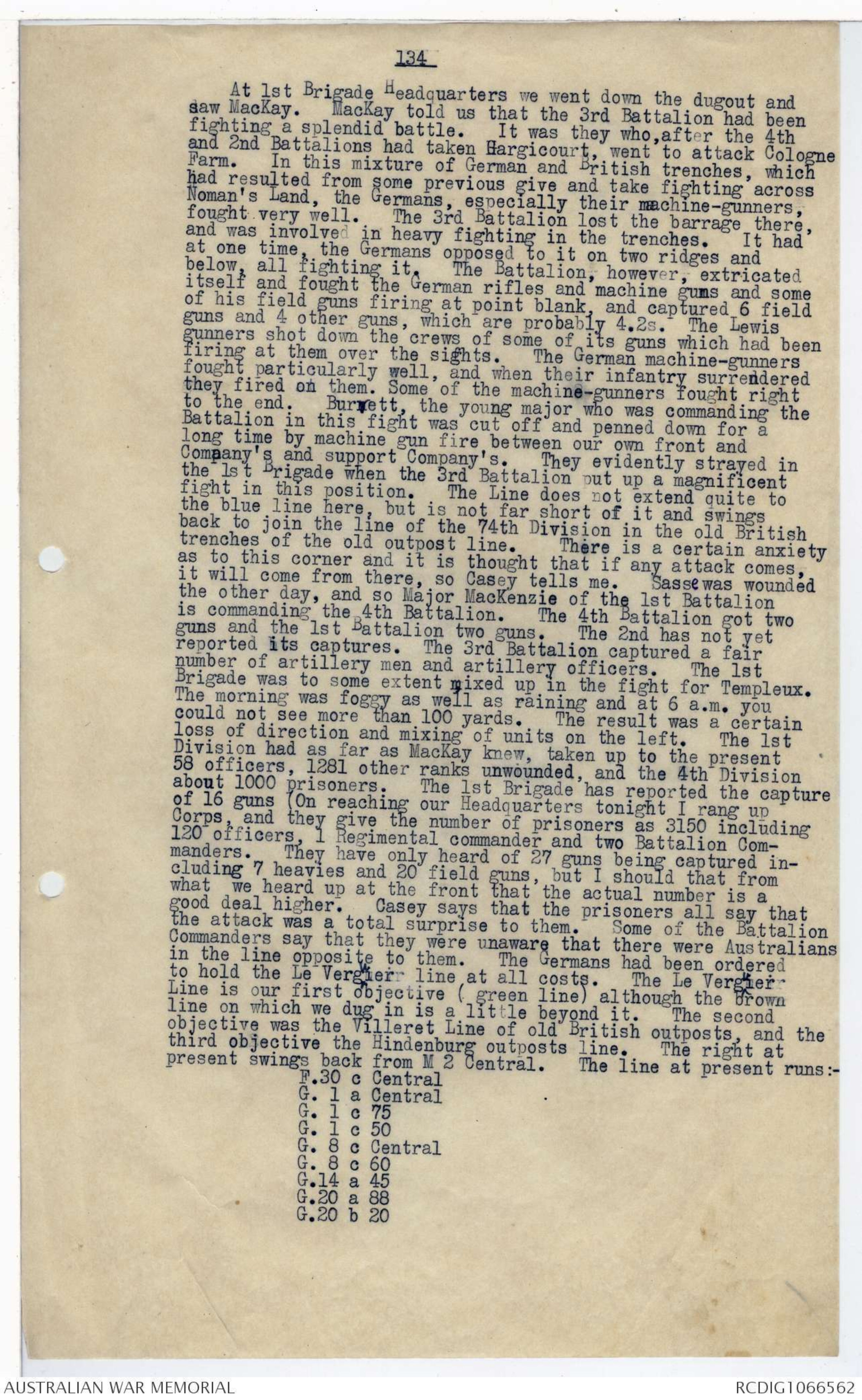
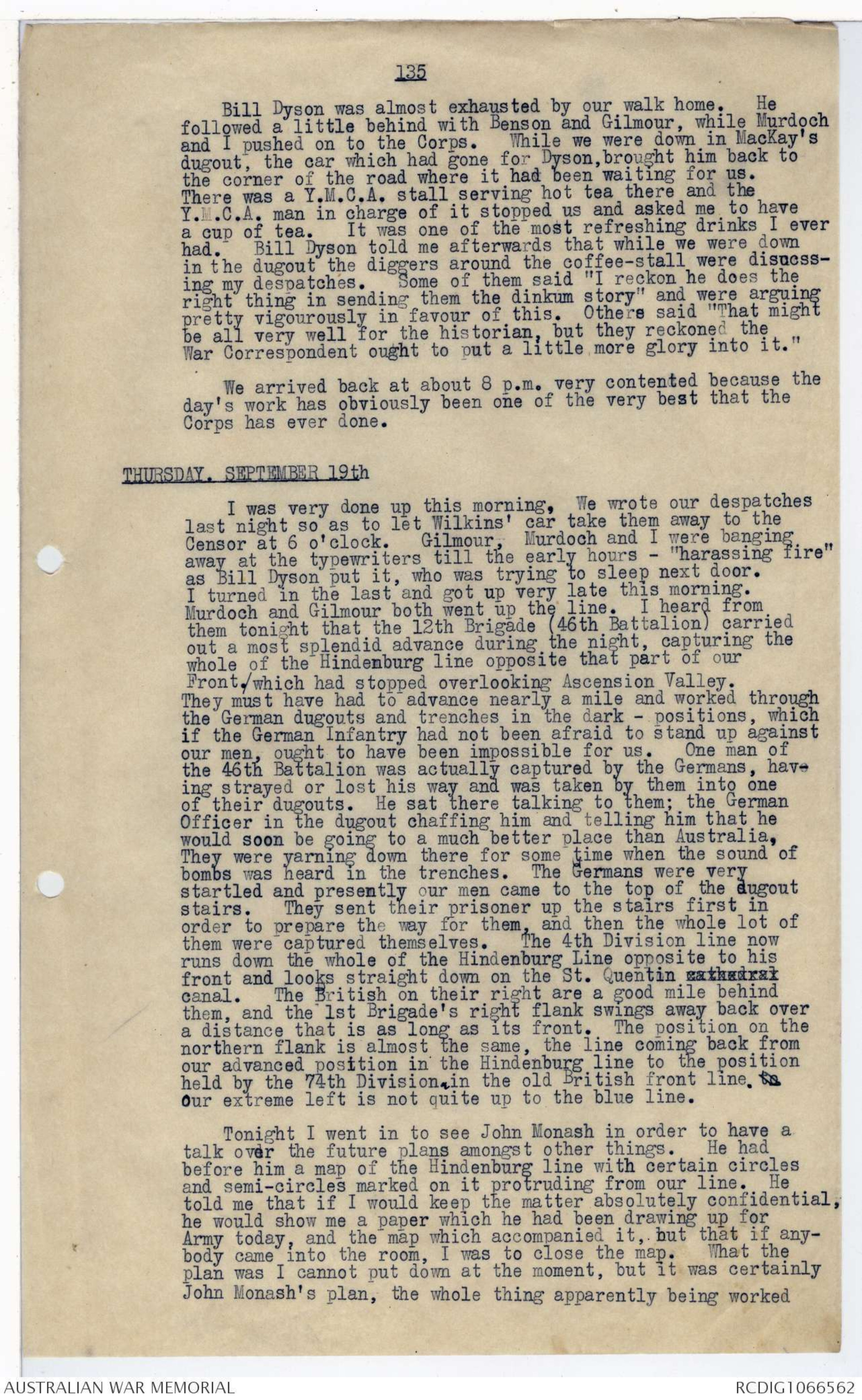
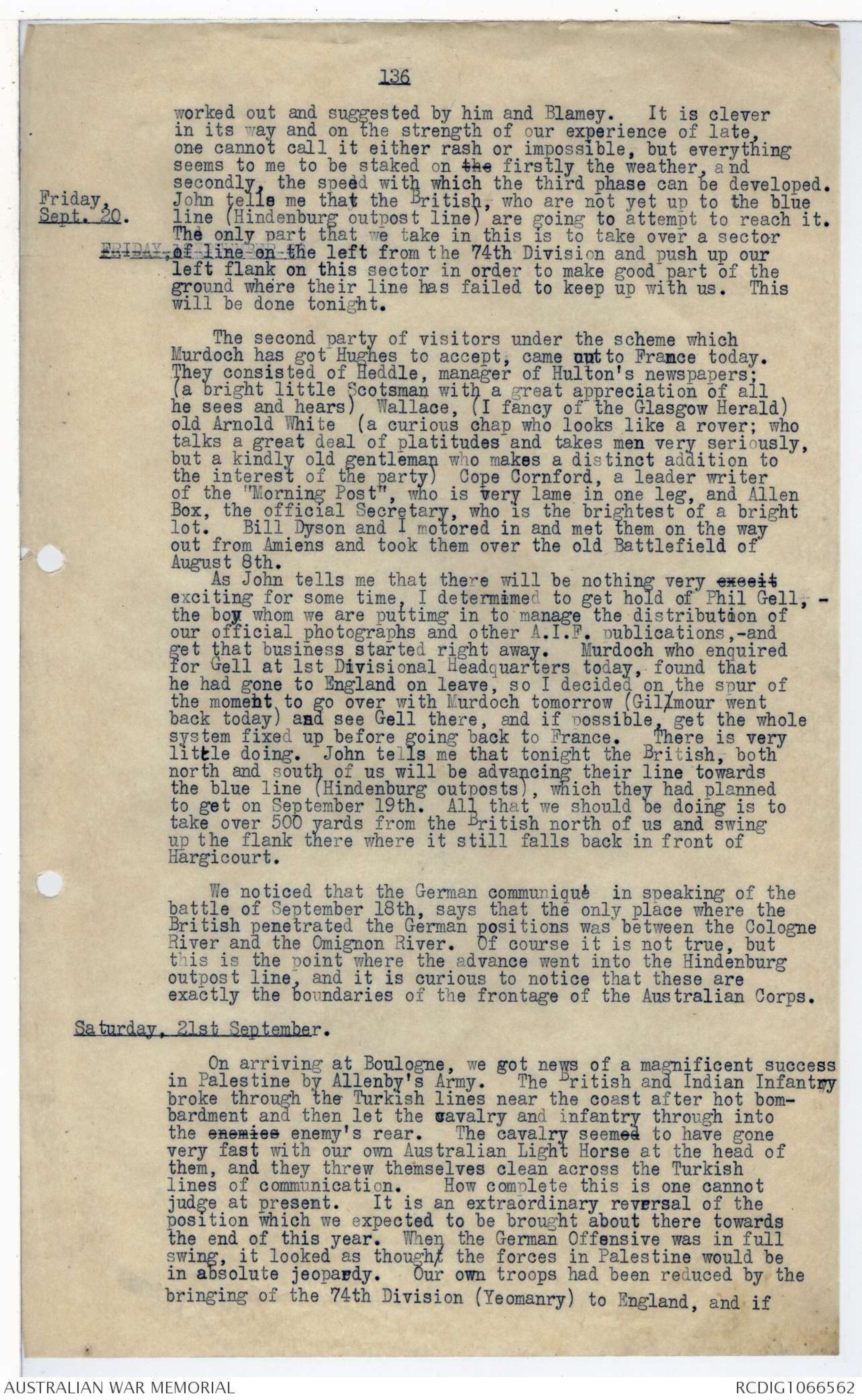
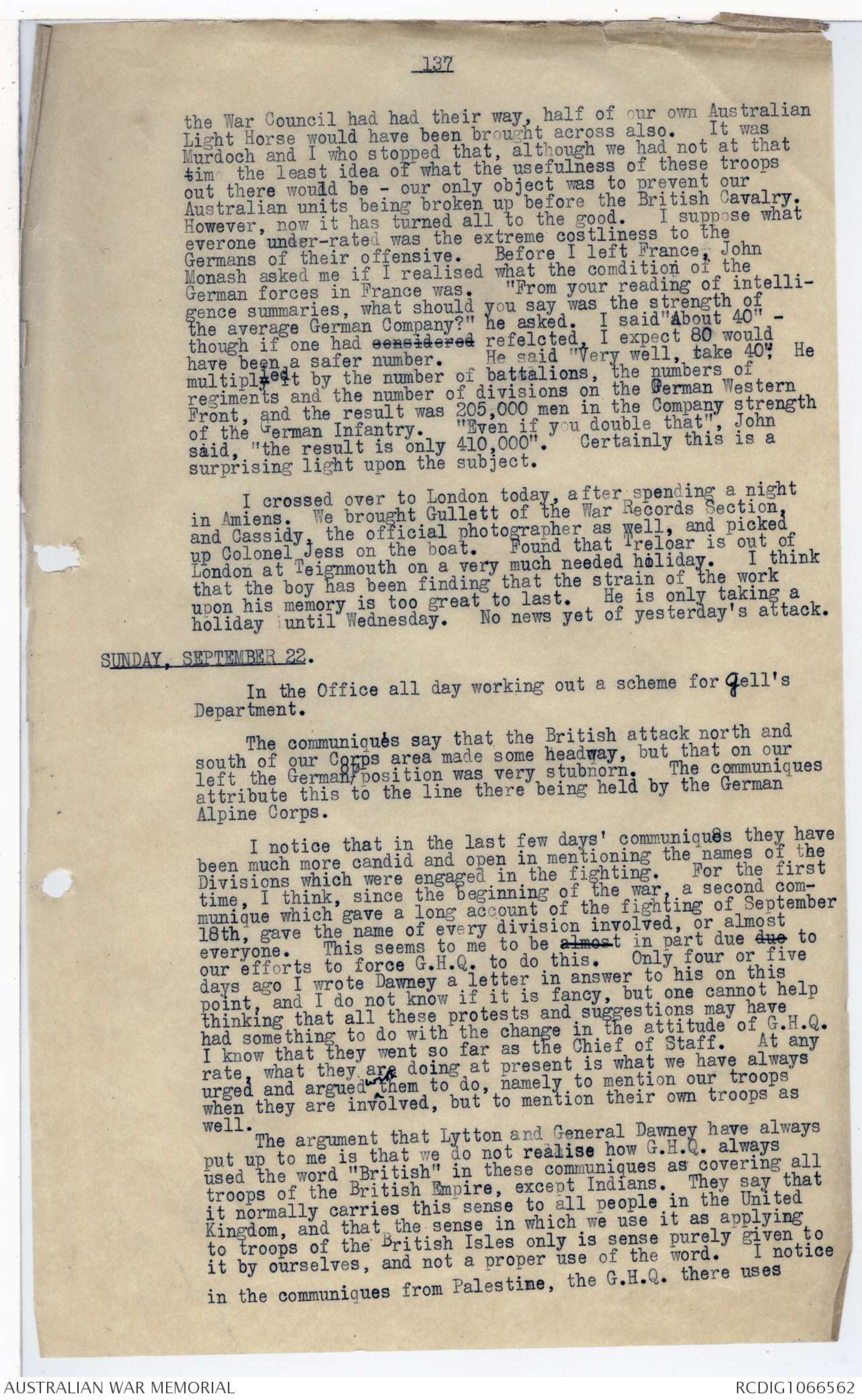
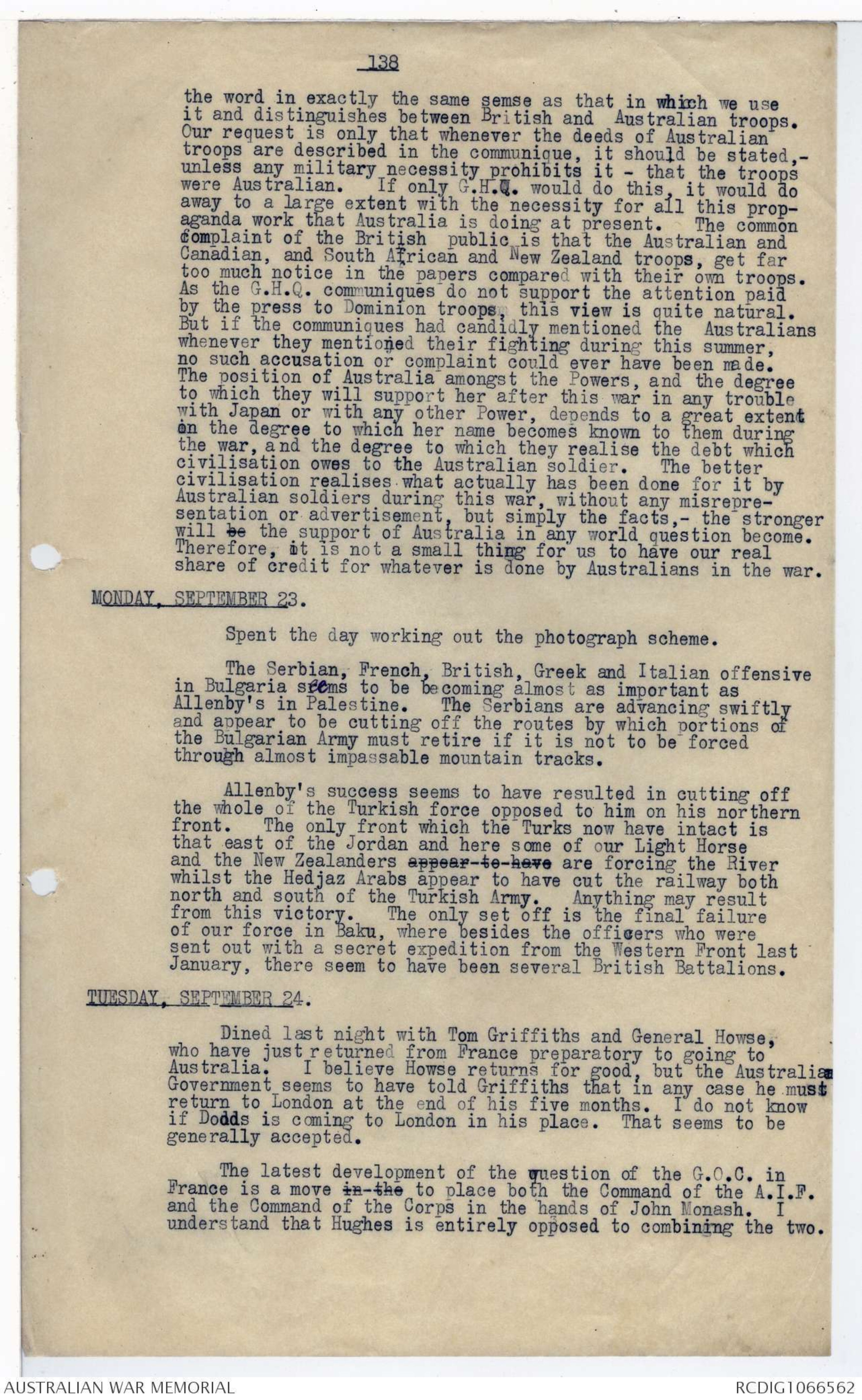
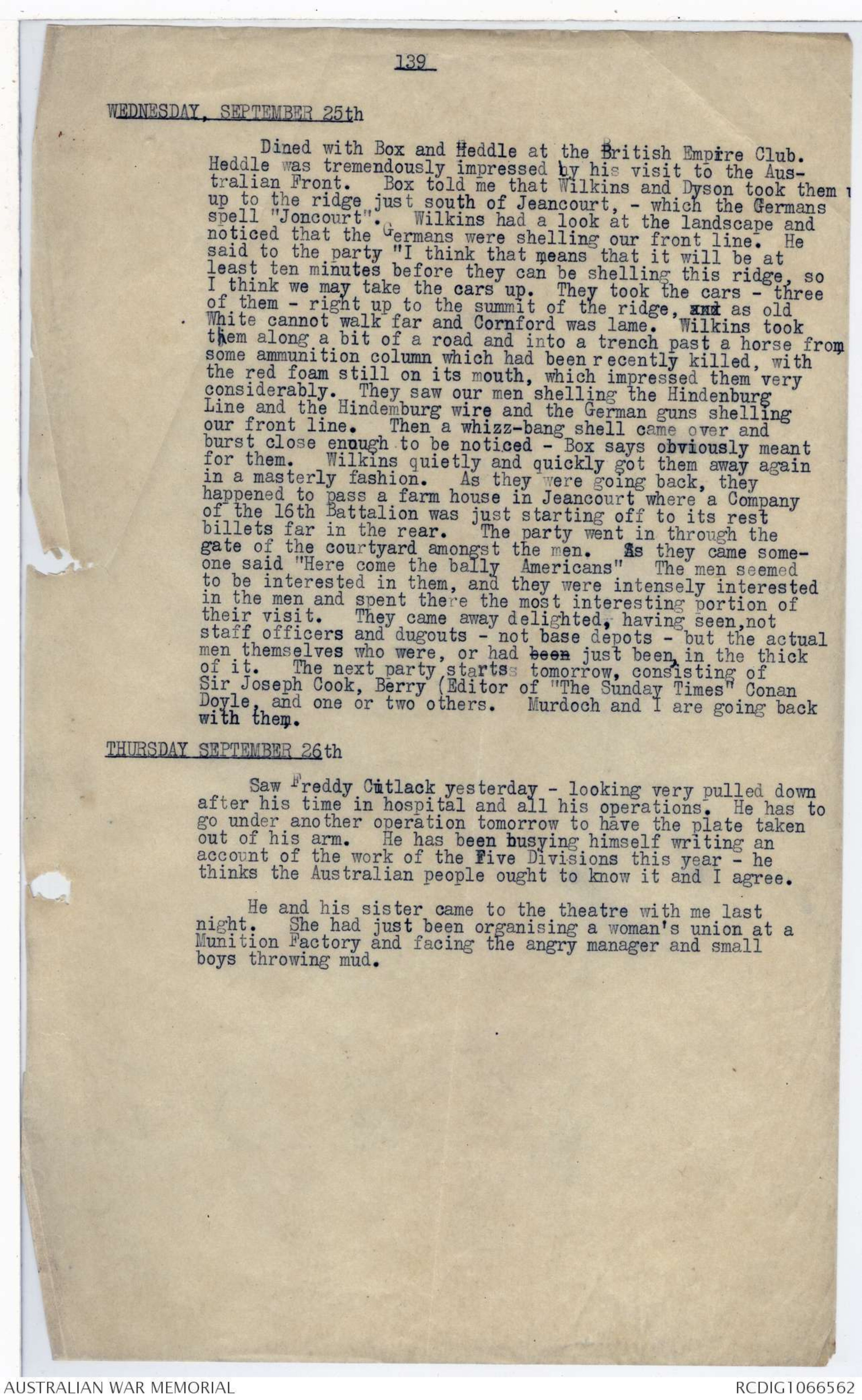
132.
near the crossroads at 23 Central, there is a bit of a quarry
with two or three German Machine guns still standing in it,
and a number of dugouts or shelters round it. I should not
wonder if some of the opposition also came from there. At
any rate, along the crest of the tongue there were lying about
8 or 10 men within easy range of our eyes, who had evidently
been caught by machine guns during this advance. We pushed
p the far slope of the valley a little north of Le Grand Priel
farm, towards the narrow crest. The hill here is a long narre
narrow, grass-colvoulered neck of chalk with some of the old
English trenches running down it, and wired, curiously enough,
on their rearward side as well as on the other. In the
trenches on the top of the hill, we could see men here clearly
in position there and who were not wandering to any extentfor over the top. Away at the north end of the valley, on
the skyline, was a big German gun standing all by itself,
which we took to be the 8 inch gun mentioned by the 9th Bn.
When we got to the men in the old English trenches on the
top of the hill, there were some shots whistling over the top
and they told us that the final phase of the exploitation was
not yet complete, but that the troops were still working
towards their objective in the Hindenburg outposts line and
that the German was attacking a good deal and sniping at them
from over the top. We accordingly kept to the trenches and
worked round them to a point on the south-eastern slope -
probably Ewe Post. The 15th Bn. were holding this position.
The trenches there were shallow outlined trenches about a
foot deep, completely and squarely cut and our men were diggingattacking in small rifle pits for themselves in these.
The trenches showed no signs of heavy bombardment, being
pretty well clear cut, but of course the Germans may have conccentrated
on certain positions which they knew to be occupied.
This we could not tell. There were no dugouts so far as we
could see although there had been some safe shelters on the
rearward slope of the hill. These were the old British outpost
trenches, in which we now were. Our men were clearly
still working ahead on the ridge which runs towards Haute
Bruyeure 'the positions where this day 3 German guns had been
cut off and the German teams prevented from saving them)
Our guns once or twice put down quite a heavy barrage there to
cover some movement about 500 to 1000 yards ahead of us and
German machine guns were occasionally sweeping the grass on
which we were. Whilst I was taking a photograph of one of the
Queenslanders digging his in the trench, a couple of
rifle bullets from a very distant rifle whistled down. I
took it at once that these were sniping shots, as it so often
happens when you take out a camera that these shots fall near
you, but I am not sure that the range was not too long and
Benson, who ought toknow more than I do, thought that they
were certainly strays. Murdoch was very interested in
searching the slopes opposite, beyond what must have been the
line of the canal, where he picked up the Germans with two
horse teams moving some of their guns, and a good many Germans
moving about in small parties. On the foreslope of the hill
there one could see the white chalk parapet of the Hindenburg
Line with big, broad, straight-cut angular formations of wire
in front of it - very much as we saw them when first we came
in sight of this famous fortification near Bullecourt. Away
to the right, over the hilltop, was the long, low roof and squ
square tower of St.Quentin Cathedral, still undamaged apparently
by any shellfire. Ahead, rather to the left, were the
trees and a few of the buildings of Bellicourt rising out of
the moorlands, much as Paschaendale rose from the Broodseinde
Ridge. Whilst we were watching, there came up a young officer
of the 15th Battalion who seeing that I had a camera, asked
Murdoch if we were the official photographers. We told him
who we were. He was one of the very best type of Australian
Officer - a boy named Livingston from Melbourne. He was
cheerful, made light of the difficulties of the day, and was
133.
especially proud of having brought his platoon through it
without having a single man killed. He said that his chief
difficulty was that he had almost tired himself out in going
up and down the line preventing the diggers from getting
into their own barrage.
It was a complete surprise to me to find that the men
were in such good heart. One wcould expect to find them
depressed owing to the morning's rain and to the excessively
hard work. Of course the 4th Division has not had such a bad
time as the 1st; it has had a good deal longer rest and is
not so short of men. It is 1600 men below establishment,
whereas the 1st Division went into this fight 4000 short.
Still there is about these Australians an extraordinary
buoyancy which surprises even those who know them best. If
this attack had gone against them, we should all, I expect,
be ready to blame the General for putting on the Corps a task
which was too heavy for it. As it was, he was clearly right
in his estimate - that the Germans in front of us were so
broken that it did not matter what trenches his Infantry
was in - that Infantry would not stand and face our men.
The day had turned out a beautiful one, and of course
that contributed a good deal to the spirits of the men.
At 3.45 p.m. we turned homewards, as we had to catch Boddy
and the cars at 1st Brigade Headquarters at 6 o'clock, or
6.30. We cut down across the small valley behind the front
line, where we saw at least one dead German opposite the
slope on which the 10th Battalion had suffered, and over the
tongue of hill south of Villeret. On the rearward slope
of this, down near the road, which runs down the valley,
there were some exceedingly deep and clearly squarely built
trenches - so completely cut that I should have said that
they were old German trenches and not of British design.
Possibly they were made by the Germans before their retreat
in the Spring of 1917.
Bill Dyson, who is an inveterate souvenir hunter and
salvager, and always gets something or other out of every
trench he passes, picked up a pair of German gas goggles,
which he gave me for use in the car, and with various other
souvenirs, we tramped a little west of Villeret and towards
the hill south of Hargicourt. The big dump east of Hargicourt
looks very like the fosses near Templeux le Gerard, and
Murdoch was rather inclined to steer us towards this by
mistake; but fortunately, I had noticed this beforehand and
kept the party on a fairly straight track towards the old
position on the hill at 8 Central. The Germans seemed to be
shelling the ridge behind us fairly heavily as we went on and
it looked to me as though they might be making a counter-attack
up in the direction of Cologne Farm or a little south
of it.
The walk home seemed a very long one. On the hill near
8 Central, Murdoch and I, who had pushed ahead, passed a man
of the 2nd Battalion who had been killed instantaneously by
a shell fragment which had driven into his chest, past the
collar-bone. His letter wallet was lying beside him, having
evidently been opened by some stranger who wanted to identify
him. Murdoch opened one of the letters.- it was from his
girl in England;- an imploring letter, asking why there was
again such a long interval between his letters and why he
was not writing. She wanted him to take her to his people.
"Surely" she said, "they know the sort of girl I am". Poor
chap! Perhaps he was pretty careless, but at any rate he was
keeping her letters pretty carefully in his breast pocket.
He had evidently been killed instantaneously because his
rifle was still slung over his right arm, and his first action
would have been to have freed his arm from the sling.
134
At 1st Brigade Headquarters we went down the dugout and
saw MacKay. MacKay told us that the 3rd Battalion had been
fighting a splendid battle. It was they who, after the 4th
and 2nd Battalions had taken Hargicourt, went to attack Cologne
Farm. In this mixture of German and British trenches, which
had resulted from some previous give and take fighting across
Noman's Land, the Germans, especially their machine-gunners,
fought very well. The 3rd Battalion lost the barrage there,
and was involved in heavy fighting in the trenches. It had
at one time, the Germans opposed to it on two ridges and
below, all fighting it. The Battalion, however, extricated
itself and fought the German rifles and machine guns and some
of his field guns firing at point blank, and captured 6 field
guns and 4 other guns, which are probably 4.2s. The Lewis
gunners shot down the crews of some of its guns which had been
firing at them over the sights. The German machine-gunners
fought particularly well, and when their infantry surrendered
they fired on them. Some of the machine-gunners fought right
to the end. Burrett, the young major who was commanding the
Battalion in this fight was cut off and penned down for a
long time by machine gun fire between our own front and
Company's and support Company's. They evidently strayed in
the 1st Brigade when the 3rd Battalion put up a magnificent
fight in this position. The Line does not extend quite to
the blue line here, but is not far short of it and swings
back to join the line of the 74th Division in the old British
trenches of the old outpost line. There is a certain anxiety
as to this corner and it is thought that if any attack comes,
it will come from there, so Casey tells me. Sasse was wounded
the other day, and so Major MacKenzie of the 1st Battalion
is commanding the 4th Battalion. The 4th Battalion got two
guns and the 1st Battalion two guns. The 2nd has not yet
reported its captures. The 3rd Battalion captured a fair
number of artillery men and artillery officers. The 1st
Brigade was to some extent mixed up in the fight for Templeux.
The morning was foggy as well as raining and at 6 a.m. you
could not see more than 100 yards. The result was a certain
loss of direction and mixing of units on the left. The 1st
Division had as far as MacKay knew, taken up to the present
58 officers, 1281 other ranks unwounded, and the 4th Division
about 1000 prisoners. The 1st Brigade has reported the capture
of 16 guns (On reaching our Headquarters tonight I rang up
Corps, and they give the number of prisoners as 3150 including
120 officers, 1 Regimental commander and two Battalion Commanders.
They have only heard of 27 guns being captured including
7 heavies and 20 field guns, but I should that from
what we heard up at the front that the actual number is a
good deal higher. Casey says that the prisoners all say that
the attack was a total surprise to them. Some of the Battalion
Commanders say that they were unaware that there were Australians
in the line opposite to them. The Germans had been ordered
to hold the Le Verg^uier line, at all costs. The Le Verg^uier
Line is our first objective (green line) although the brown
line on which we dug in is a little beyond it. The second
objective was the Villeret Line of old British outposts, and the
third objective the Hindenburg outposts line. The right at
present swings back from M 2 Central. The line at present runs:-
F.30 c Central
G. 1 a Central
G. 1 c 75
G. 1 c 50
G. 8 c Central
G. 8 c 60
G. 14 a 45
G. 20 a 88
G. 20 b 20
135
Bill Dyson was almost exhausted by our walk home. He
followed a little behind with Benson and Gilmour, while Murdoch
and I pushed on to the Corps. While we were down in MacKay's
dugout, the car which had gone for Dyson, brought him back to
the corner of the road where it had been waiting for us.
There was a Y.M.C.A. stall serving hot tea there and the
Y.M.C.A. man in charge of it stopped us and asked me to have
a cup of tea. It was one of the most refreshing drinks I ever
had. Bill Dyson told me afterwards that while we were down
in the dugout the diggers around the coffee-stall were disucssing
my despatches. Some of them said "I reckon he does the
right thing in sending them the dinkum story" and were arguing
pretty vigourously in favour of this. Others said "That might
be all very well for the historian, but they reckoned the
War Correspondent ought to put a little more glory into it."
We arrived back at about 8 p.m. very contented because the
day's work has obviously been one of the very best that the
Corps has ever done.
THURSDAY. SEPTEMBER 19th
I was very done up this morning, We wrote our despatches
last night so as to let Wilkins' car take them away to the
Censor at 6 o'clock. Gilmour, Murdoch and I were banging
away at the typewriters till the early hours - "harassing fire"
as Bill Dyson put it, who was trying to sleep next door.
I turned in the last and got up very late this morning.
Murdoch and Gilmour both went up the line. I heard from
them tonight that the 12th Brigade (46th Battalion) carried
out a most splendid advance during the night, capturing the
whole of the Hindenburg line opposite that part of our
Front. which had stopped overlooking Ascension Valley.
They must have had to advance nearly a mile and worked through
the German dugouts and trenches in the dark - positions, which
if the German Infantry had not been afraid to stand up against
our men, ought to have been impossible for us. One man of
the 46th Battalion was actually captured by the Germans, having
strayed or lost his way and was taken by them into one
of their dugouts. He sat there talking to them; the German
Officer in the dugout chaffing him and telling him that he
would soon be going to a much better place than Australia,
They were yarning down there for some time when the sound of
bombs was heard in the trenches. The Germans were very
startled and presently our men came to the top of the dugout
stairs. They sent their prisoner up the stairs first in
order to prepare the way for them, and then the whole lot of
them were captured themselves. The 4th Division line now
runs down the whole of the Hindenburg Line opposite to his
front and looks straight down on the St. Quentin cathedral
canal. The British on their right are a good mile behind
them, and the 1st Brigade's right flank swings away back over
a distance that is as long as its front. The position on the
northern flank is almost the same, the line coming back from
our advanced position in the Hindenburg line to the position
held by the 74th Division, in the old British front line, to
our extreme left is not quite up to the blue line.
Tonight I went in to see John Monash in order to have a
talk over the future plans amongst other things. He had
before him a map of the Hindenburg line with certain circles
and semi-circles marked on it protruding from our line. He
told me that if I would keep the matter absolutely confidential,
he would show me a paper which he had been drawing up for
Army today, and the map which accompanied it, but that if anybody
came into the room, I was to close the map. What the
plan was I cannot put down at the moment, but it was certainly
John Monash's plan, the whole thing apparently being worked
136
[*Friday,
Sept. 20.*]
worked out and suggested by him and Blamey. It is clever
in its way and on the strength of our experience of late,
one cannot call it either rash or impossible, but everything
seems to me to be staked on the firstly the weather, and
secondly, the speed with which the third phase can be developed.
John tells me that the British, who are not yet up to the blue
line (Hindenburg outpost line) are going to attempt to reach it.
The only part that we take in this is to take over a sector
of line on the left from the 74th Division and push up our
left flank on this sector in order to make good part of the
ground where their line has failed to keep up with us. This
will be done tonight.
The second party of visitors under the scheme which
Murdoch has got Hughes to accept, came out to France today.
They consisted of Heddle, manager of Hulton's newspapers;
(a bright little Scotsman with a great appreciation of all
he sees and hears) Wallace, (I fancy of the Glasgow Herald)
old Arnold White (a curious chap who looks like a rover; who
talks a great deal of platitudes and takes men very seriously,
but a kindly old gentleman who makes a distinct addition to
the interest of the party) Cope Cornford, a leader writer
of the "Morning Post", who is very lame in one leg, and Allen
Box, the official Secretary, who is the brightest of a bright
lot. Bill Dyson and I motored in and met them on the way
out from Amiens and took them over the old Battlefield of
August 8th.
As John tells me that there will be nothing very exceit
exciting for some time, I determimed to get hold of Phil Gell, -
the boy whom we are puttimg in to manage the distribution of
our official photographs and other A.I.F. publications,-and
get that business started right away. Murdoch who enquired
for Gell at 1st Divisional Headquarters today, found that
he had gone to England on leave, so I decided on the spur of
the moment to go over with Murdoch tomorrow (Gillmour went
back today) and see Gell there, and if possible, get the whole
system fixed up before going back to France. There is very
little doing. John tells me that tonight the British, both
north and south of us will be advancing their line towards
the blue line (Hindenburg outposts), which they had planned
to get on September 19th. All that we should be doing is to
take over 500 yards from the British north of us and swing
up the flank there where it still falls back in front of
Hargicourt.
We noticed that the German communiqué in speaking of the
battle of September 18th, says that the only place where the
British penetrated the German positions was between the Cologne
River and the Omignon River. Of course it is not true, but
this is the point where the advance went into the Hindenburg
outpost line, and it is curious to notice that these are
exactly the boundaries of the frontage of the Australian Corps.
Saturday, 21st September.
On arriving at Boulogne, we got news of a magnificent success
in Palestine by Allenby's Army. The British and Indian Infantry
broke through the Turkish lines near the coast after hot bombardment
and then let the cavalry and infantry through into
the enemies enemy's rear. The cavalry seemed to have gone
very fast with our own Australian Light Horse at the head of
them, and they threw themselves clean across the Turkish
lines of communication. How complete this is one cannot
judge at present. It is an extraordinary reversal of the
position which we expected to be brought about there towards
the end of this year. When the German Offensive was in full
swing, it looked as thought the forces in Palestine would be
in absolute jeopardy. Our own troops had been reduced by the
bringing of the 74th Division (Yeomanry) to England, and if
137
the War Council had had their way, half of our own Australian
Light Horse would have been brought across also. It was
Murdoch and I who stopped that, although we had not at thattime the least idea of what the usefulness of these troops
out there would be - our only object was to prevent our
Australian units being broken up before the British Cavalry.
However, now it has turned all to the good. I suppose what
everone under-rated was the extreme costliness to the
Germans of their offensive. Before I left France, John
Monash asked me if I realised what the comdition of the
German forces in France was. "From your reading of intelligence
summaries, what should you say was the strength of
the average German Company?" he asked. I said "About 40" -
though if one had considered reflected, I expect 80 would
have been a safer number. He said "Very well, take 40", He
multiplyied it by the number of battalions, the numbers of
regiments and the number of divisions on the German Western
Front, and the result was 205,000 men in the Company strength
of the German Infantry. "Even if you double that", John
said, "the result is only 410,000". Certainly this is a
surprising light upon the subject.
I crossed over to London today, after spending a night
in Amiens. We brought Gullett of the War Records Section,
and Cassidy, the official photographer as well, and picked
up Colonel Jess on the boat. Found that Treloar is out of
London at Teignmouth on a very much needed holiday. I think
that the boy has been finding that the strain of the work
upon his memory is too great to last. He is only taking a
holiday until Wednesday. No news yet of yesterday's attack.
SUNDAY, SEPTEMBER 22.
In the Office all day working out a scheme for Gell's
Department.
The communiqués say that the British attack north and
south of our Corps area made some headway, but that on our
left the German ^opposition was very stubnorn. The communiques
attribute this to the line there being held by the German
Alpine Corps.
I notice that in the last few days' communiques they have
been much more candid and open in mentioning the names of the
Divisions which were engaged in the fighting. For the first
time, I think, since the beginning of the war, a second communique
which gave a long account of the fighting of September
18th, gave the name of every division involved, or almost
everyone. This seems to me to be almost in part due due to
our efforts to force G.H.Q. to do this. Only four or five
days ago I wrote Dawney a letter in answer to his on this
point, and I do not know if it is fancy, but one cannot help
thinking that all these protests and suggestions may have
had something to do with the change in the attitude of G.H.Q.
I know that they went so far as the Chief of Staff. At any
rate, what they are doing at present is what we have always
urged and argued ^with them to do, namely to mention our troops
when they are involved, but to mention their own troops as
well.
The argument that Lytton and General Dawney have always
put up to me is that we do not realise how G.H.Q. always
used the word "British" in these communiques as covering all
troops of the British Empire, except Indians. They say that
it normally carries this sense to all people in the United
Kingdom, and that the sense in which we use it as applying
to troops of the British Isles only is sense purely given to
it by ourselves, and not a proper use of the word. I notice
in the communiques from Palestine, the G.H.Q. there uses
138
the word in exactly the same semse as that in which we use
it and distinguishes between British and Australian troops.
Our request is only that whenever the deeds of Australian
troops are described in the communique, it should be stated,-
unless any military necessity prohibits it - that the troops
were Australian. If only G.H.Q. would do this, it would do
away to a large extent with the necessity for all this propaganda
work that Australia is doing at present. The common
complaint of the British public is that the Australian and
Canadian, and South African and New Zealand troops, get far
too much notice in the papers compared with their own troops.
As the G.H.Q. communiques do not support the attention paid
by the press to Dominion troops, this view is quite natural.
But if the communiques had candidly mentioned the Australians
whenever they mentioned their fighting during this summer,
no such accusation or complaint could ever have been made.
The position of Australia amongst the Powers, and the degree
to which they will support her after this war in any trouble
with Japan or with any other Power, depends to a great extent
on the degree to which her name becomes known to them during
the war, and the degree to which they realise the debt which
civilisation owes to the Australian soldier. The better
civilisation realises what actually has been done for it by
Australian soldiers during this war, without any misrepresentation
or advertisement, but simply the facts,- the stronger
will be the support of Australia in any world question become.
Therefore, it is not a small thing for us to have our real
share of credit for whatever is done by Australians in the war.
MONDAY, SEPTEMBER 23.
Spent the day working out the photograph scheme.
The Serbian, French, British, Greek and Italian offensive
in Bulgaria seems to be becoming almost as important as
Allenby's in Palestine. The Serbians are advancing swiftly
and appear to be cutting off the routes by which portions of
the Bulgarian Army must retire if it is not to be forced
through almost impassable mountain tracks.
Allenby's success seems to have resulted in cutting off
the whole of the Turkish force opposed to him on his northern
front. The only front which the Turks now have intact is
that east of the Jordan and here some of our Light Horse
and the New Zealanders appear to have are forcing the River
whilst the Hedjaz Arabs appear to have cut the railway both
north and south of the Turkish Army. Anything may result
from this victory. The only set off is the final failure
of our force in Baku, where besides the officers who were
sent out with a secret expedition from the Western Front last
January, there seem to have been several British Battalions.
TUESDAY, SEPTEMBER 24.
Dined last night with Tom Griffiths and General Howse,
who have just returned from France preparatory to going to
Australia. I believe Howse returns for good, but the Australian
Government seems to have told Griffiths that in any case he must
return to London at the end of his five months. I do not know
if Dodds is coming to London in his place. That seems to be
generally accepted.
The latest development of the question of the G.O.C. in
France is a move in the to place both the Command of the A.I.F.
and the Command of the Corps in the hands of John Monash. I
understand that Hughes is entirely opposed to combining the two.
139
WEDNESDAY, SEPTEMBER 25th
Dined with Box and Heddle at the British Empire Club.
Heddle was tremendously impressed by his visit to the Australian
Front. Box told me that Wilkins and Dyson took them
up to the ridge just south of Jeancourt, - which the Germans
spell "Joncourt". Wilkins had a look at the landscape and
noticed that the Germans were shelling our front line. He
said to the party "I think that means that it will be at
least ten minutes before they can be shelling this ridge, so
I think we may take the cars up. They took the cars - three
of them - right up to the summit of the ridge, and as old
White cannot walk far and Cornford was lame. Wilkins took
them along a bit of a road and into a trench past a horse from
some ammunition column which had been recently killed, with
the red foam still on its mouth, which impressed them very
considerably. They saw our men shelling the Hindenburg
Line and the Hindemburg wire and the German guns shelling
our front line. Then a whizz-bang shell came over and
burst close enough to be noticed - Box says obviously meant
for them. Wilkins quietly and quickly got them away again
in a masterly fashion. As they were going back, they
happened to pass a farm house in Jeancourt where a Company
of the 16th Battalion was just starting off to its rest
billets far in the rear. The party went in through the
gate of the courtyard amongst the men. As they came someone
said "Here come the bally Americans" The men seemed
to be interested in them, and they were intensely interested
in the men and spent there the most interesting portion of
their visit. They came away delighted, having seen, not
staff officers and dugouts - not base depots - but the actual
men themselves who were, or had been just been, in the thick
of it. The next party starts tomorrow, consisting of
Sir Joseph Cook, Berry (Editor of "The Sunday Times" Conan
Doyle, and one or two others. Murdoch and I are going back
with them.
THURSDAY SEPTEMBER 26th
Saw Freddy Cutlack yesterday - looking very pulled down
after his time in hospital and all his operations. He has to
go under another operation tomorrow to have the plate taken
out of his arm. He has been busying himself writing an
account of the work of the Five Divisions this year - he
thinks the Australian people ought to know it and I agree.
He and his sister came to the theatre with me last
night. She had just been organising a woman's union at a
Munition Factory and facing the angry manager and small
boys throwing mud.
 Diane Ware
Diane WareThis transcription item is now locked to you for editing. To release the lock either Save your changes or Cancel.
This lock will be automatically released after 60 minutes of inactivity.